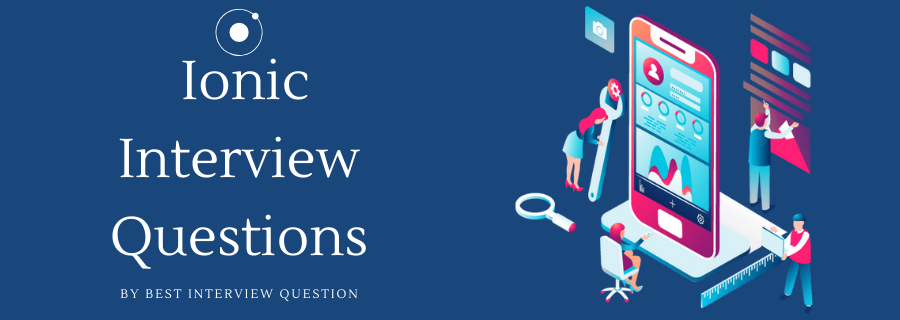
A front-end, HTML5 mobile application development framework, Ionic is designed to build hybrid apps. You can think of Ionic as the framework that manages the look, feel and UI an app needs to be attractive. The ionic structure uses web technologies such as CSS, HTML5, and Sass for developing hybrid mobile apps. These apps can then be distributed through native app stores on individual devices through Cordova.
With built-in native mobile elements and layouts, Ionic offers powerful ways to build mobile apps that are both attractive and have high performance. Ionic being an HTML5 framework, it requires Cordova or PhoneGap to run as a native app. We have recently updated our ionic interview questions. Do read them before your next job interview.
Advantages of Ionic
- Its cross-platform nature allows you to package apps for multi-platforms which saves time.
- Provides pre-generated application setup with a convenient layout
- Apps are easy to maintain and update
- Good online support groups
Are you an ionic programmer? Read our ionic interview questions and answers to stay updated.
Most Frequently Asked Ionic Interview Questions
Here in this article, we will be listing frequently asked Ionic Interview Questions and Answers with the belief that they will be helpful for you to gain higher marks. Also, to let you know that this article has been written under the guidance of industry professionals and covered all the current competencies.
| PhoneGap | Ionic | Cordova | |
|---|---|---|---|
| 1. | Developed by Adobe Systems. | Used to build cross-platform mobile apps | JavaScript framework for building apps |
| 2. | Used for developing mobile apps. | Built on top of Angular JS and Cordova. | Complements other web technologies to develop apps |
| 3. | Provides Adobe services features. | Also known as Apache Cordova |
Ionic apps use UI-router and AngularJS. This means we can use Angular services to pass data from one view to another. Angular services are singletons and therefore data stored can be accessed across controllers.
In Ionic, caching of up to ten views is done by default. This improves performance and assists in maintaining different states simultaneously in the views. For instance, cache maintains scroll position in the views or the active state of buttons.
Ionic does not offer camera API out of the box. But since Ionic uses plugins architecture, you can use Cordova plugins in your applications. Ionic offers a set of Cordova extensions that come with Angular wrappers. You can find them at ngCordova.
Ionic apps are built on AngularJS, which has a rich set of test libraries and frameworks. You can use these frameworks to write unit tests for your apps. In addition, the live reload feature in ionic-CLI can be used to test your apps in the browser. Chrome Developer Tools or Mozilla Firefox can be used to debug and inspect Ionic apps.
Ionic uses the default web browser available in the device to run hybrid applications. The older versions of Android devices use Android’s default browser, which has less performance and compliance as compared to modern browsers.
This can be resolved by using crosswalk with Ionic. Crosswalk will enable you to pack a Chrome webview so that your application is not relying on native Android browser.
Ionic prepare copies files directly from the www folder into the www folder of the target platform. Ionic build builds the app’s source code to enable it to run on an emulator/ simulator/device.
As Ionic builds HTML5 based applications behind the scene, localStorage and sessionStorage API can be used to persist data on mobile devices. However, since localStorage only stores strings, the objects need to be stringified before saving them. It is critical to remember that localStorage has a size limit of 5MB.
Ionic offers platform classes. Ionic adds different CSS classes to the <body> tag when the app is getting loaded. For instance, on iOS devices, Ionic adds platform-ios class to <body> tag. It also adds OS version classes for iOS 8 and Android 4.4
Services play a vital role in Ionic as it provides information to the application and performs different tasks. Some of the critical services are Simple Alert, Connectivity Monitor, Google Maps and data. If you are using, remember that importing a service and adding a provider to it are the most crucial aspects.
The services should only be imported into the classes where you will be using them.
Storage is the easiest way to store key, values and JSON objects in the Ionic Framework. Engines are used in storage. In a web application, storage will use WebSQL, IndexedDB, and local storage. Here are some of the storage available in ionic:
- HTML5 local storage
- Cookie and session storage
- IndexedDB
- WebSQL
- PouchDB
- Web service/api storage
- Cordova storage
Observables are not specific to Ionic or Angular. These are provided by RxJS library and can do a lot of tasks. They can deal with multiple values simultaneously and can manipulate the data associated with it. However, Observables will not get executed until you subscribe to them.
It is a Typescript wrapper for PhoneGap/Cordova plugins. Its purpose is to ease the process of adding native functionalities to your Ionic app.
| React Native | Ionic | |
|---|---|---|
| 1. | Uses functional interface | Web technologies for improved portability |
| 2. | Code language is JSX | Code language is Typescript |
| 3. | No web view | Uses web view |
| 3. | Testing requires emulator | Testing can be done on any browser |